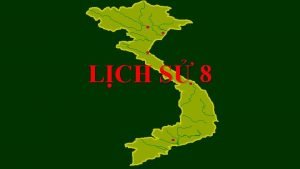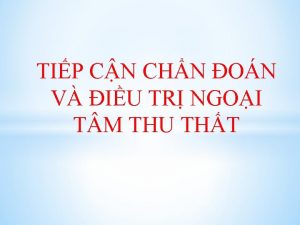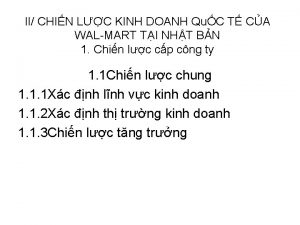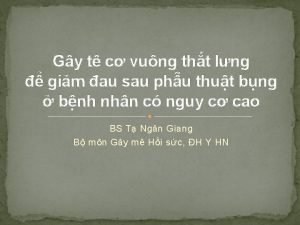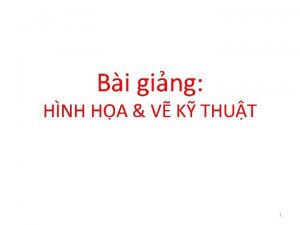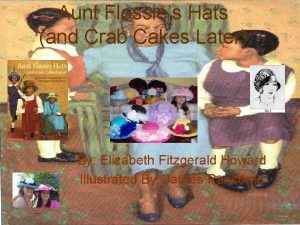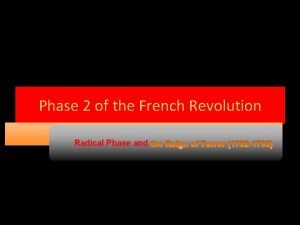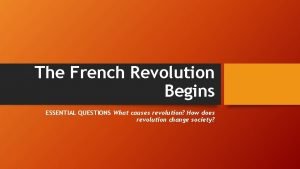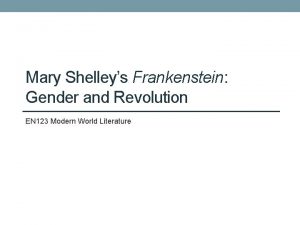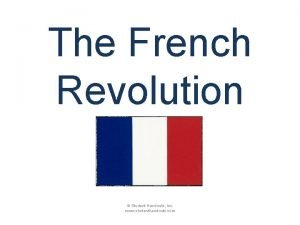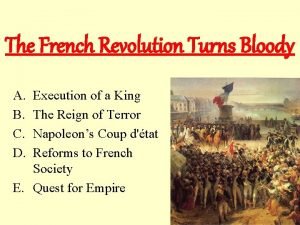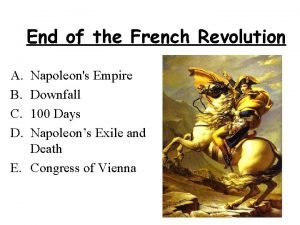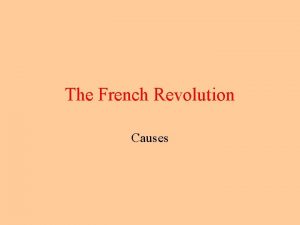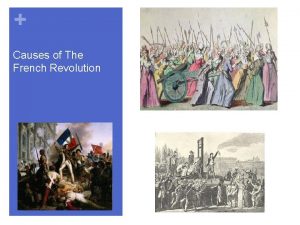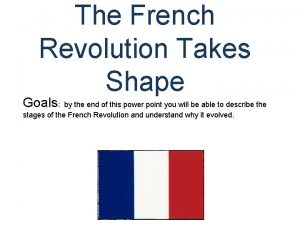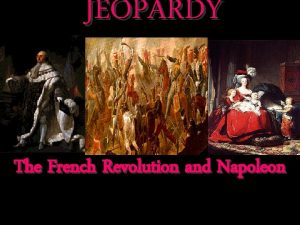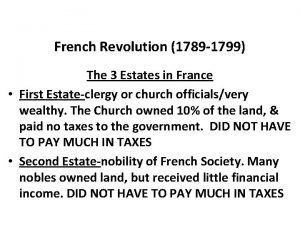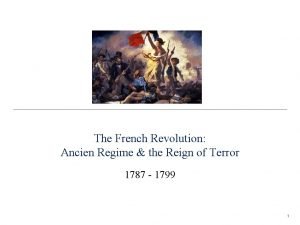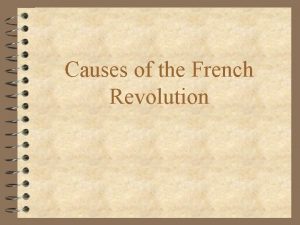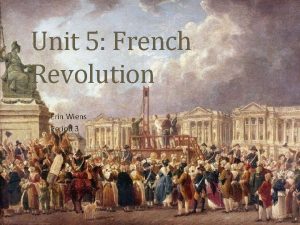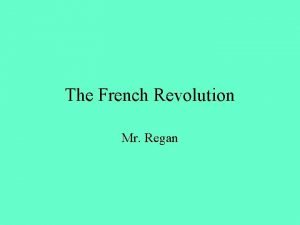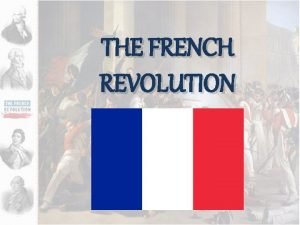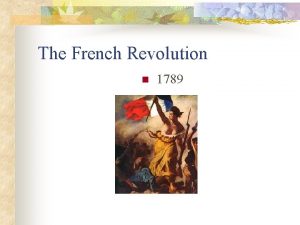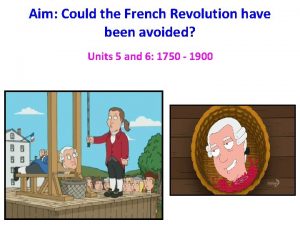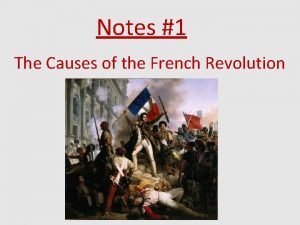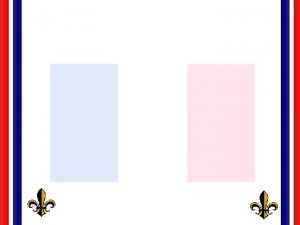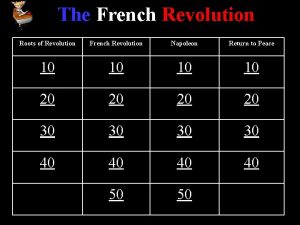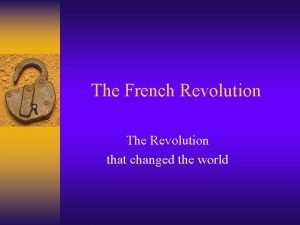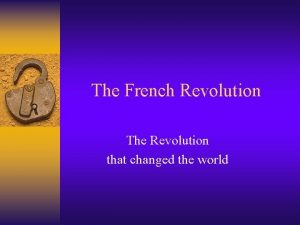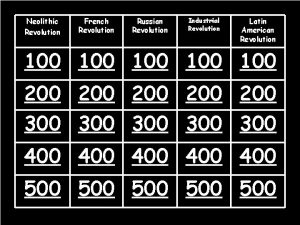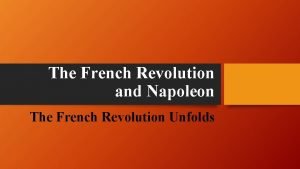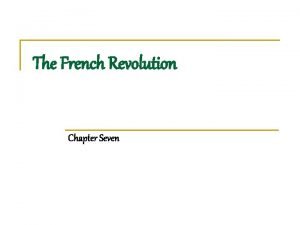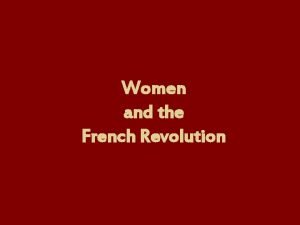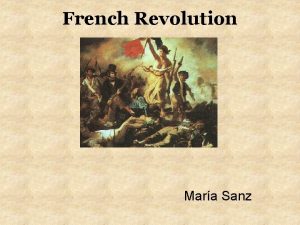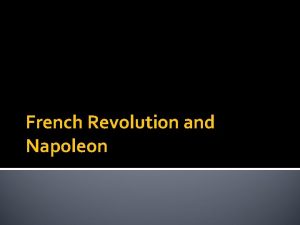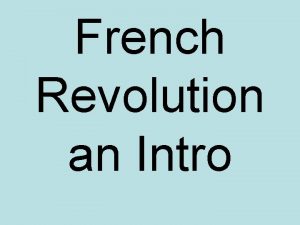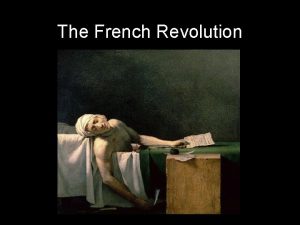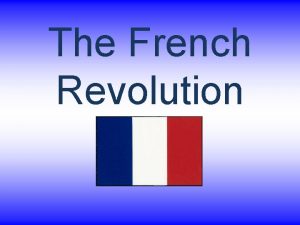The French Revolution The Revolution that changed the




































- Slides: 36

The French Revolution The Revolution that changed the world

Basics 4 Vocab ¨ Three estates – France’s 3 social classes: the clergy (1 st), the nobility (2 nd), and everyone else (3 rd) ¨ Bourgeoisie – the middle class and highest level of the 3 rd estate ¨ Estates-General – France’s legislative, law-making, body in which each estate had one vote ¨ National Assembly – Revolutionary legislature formed when the 1 st & 2 nd estates locked the 3 rd estate out of the Estates-General ¨ Tennis Court Oath – Oath taken by the National Assembly to not leave until there was a new French Constitution

More Basics 4 Vocab ¨ Bastille – Parisian prison that was destroyed July 14 th 1789 as crowds searched for weapons and gunpowder to protect themselves from the French Army ¨ Sans-culottes – working class revolutionaries who pushed for a republic and wanted to end the monarchy ¨ Jacobins – middle class lawyers and intellectuals who were in favor of a republic ¨ Émigré – clergy and nobles who fled France and revolutionaries with tales of mob violence that frightened many European monarchs

Last slide of Basics 4 Vocab ¨ Suffrage – the right to vote ¨ Robespierre – leader of the Committee of Public Safety, a Jacobin, he took control of the French Revolution and began the Reign of Terror ¨ Reign of Terror – September 1793 – July 1794 which tried about 300, 000 individuals and executed 17, 000 “enemies of the revolution” ¨ Nationalism – feelings of pride and love for one’s country






French Society: divided into three estates First Estate: Second Estate: Third Estate :

Third Estate ¨ Divided into three sub classes: ¨ 1. Merchants and artisans – Rich and well educated (liberal ideologies) ¨ 2. Working Class (cooks, servants, and others) Poor wage earners Price of bread was very important to them ¨ 3. Farmers (80% of people) Heavily taxed, had to work for nobles/ clergy for free

France’s National Problems 1. Crop failures led to grain shortages 2. Large debt due to Wars (in the Americas) – Bankers refused to lend more money 3. Weak leader

King and Queen of France ¨ Louis XVI- – Great Grandson of Louis XIV – Not very focused on his duties • Wanted to have fun (hunt, play with locks, etc) ¨ Marie Antoinette- – Daughter of Austrian Maria Theresa – big spender

Louis is forced to call the Estates. General (May 1789) ¨ meeting of all 3 estates ¨ first time in 175 yrs. ¨ Each estate gets 1 vote – (clergy had one, nobles had one) ¨ 3 rd Estate was always outvoted by the other two estates

Estates-General of May 1789 ¨ Estates-General called at request of 1 st & 2 nd Estates – Goal: To limit the powers of the monarchy • Similar to England’s Glorious Revolution ¨ 1 st and 2 nd Estate – feared losing money from Louis’ big spending…wanted to control him ¨ 3 rd Estate – complained about unequal voting rights. – Estates-General refused to listen to them and the 3 rd Estate was locked out.

Tennis Court Oath (June 1789) ¨ Third Estate met separately ¨ New name=National Assembly ¨ Declared that the Assembly, not the king, were the voice of the people

¨Tennis Court Oath (National Assembly is formed) ¨Rumor of King’s ¨Rumors start ¨King fears that the people are going revolt ¨More rumors of nobles hiring troops to kill peasants in countryside army coming to stop the NA meetings ¨People storm the Bastille to get ready (get gun powder) ¨Peasants react to the rumors by burning noble’s homes (The Great Fear-summer of 1789)


Louis was so disconnected from his people… ¨ Louis was so disconnected from the people that he wrote in journal (on the day of the Storming of the Bastille) “Rein” or “nothing happened” referring to his afternoon hunt

Palace of Versailles (where King Louis is living)

The Great Fear (July 20 th – August 5 th 1789)

Declaration of the Rights of Man – Issued August 26, 1789 – “Men are born and remain free and equal in rights” • Women were not included • Right to liberty, property, security, and resistance to oppression • Sets up a Constitutional Monarchy

Slogan of Revolution “Liberty, Equality, and Fraternity (brotherhood)”

Women’s Bread Riot, October 5 th 1789 ¨ Price of bread (and other necessities) rise ¨ Thousands of women took up arms and marched 12 miles to Versailles (King’s palace) ¨ Killed two guards ¨ Forced the king and his family to move to Paris

Louis tries to escape France (June 1791) ¨ On his way to Austria – Stopped by townsmen and guards ¨ Many argue that the King is not to be trusted

Political Spectrum: Left Right Liberal, wants extreme change Conservative, wants to go back to old times France’s Radical Groups: ¨ Sans-culottes: ¨ Émigrés: ¨ “those without knee ¨ nobles and clergy breeches” ¨ mobs wage earners of the cities ¨ far left supporters who fled France ¨ Far right supporters

Europe turns against the Revolution ¨ Austria (Marie’s Homeland) feared that the revolution against nobility would spread to other nations. – Austria declared war on France in 1792, later joined by Prussia, Holland, Spain, and England. . – French Émigrés joined with the foreigners. – Austrian and Prussian forces near Paris and threatened to destroy Paris if the Royal family was harmed – Outraged Parisian mob kills the King’s Swiss guards and imprisons the royal family in a tower.


The Last Straw: the September Massacre (1792) ¨ The Sans-culottes hear that they are losing power and kill over a 1, 000 noble, clergy & other prisoners ¨ Power is transferred to the Left Radicals called the Jacobins – No longer interested in allowing a Monarch to govern: now they want a new form of government

King No More ¨ The revolutionaries defeat the invading armies ¨ The Jacobins establish a Republic. ¨ Louis is beheaded by the Guillotine (Jan. 1793)

Guillotine ¨Decapitation was punishment for nobility=now equal

New Leader: Maximilien Robespierre Revolution goes past politics ¨ Slavery is outlawed ¨ Death penalty is outlawed (predict: why is this ironic? ) ¨ Religious Freedom for Jews and Protestants ¨ Playing cards—no jacks, queens and kings ¨ Calendar was changed to 12 months 30 days each – 10 day week, no Sundays (religion seen as old fashion) ¨ All churches were closed ¨ Bread prices were controlled

Committee of Public Safety (July 1793 to July 1794) ¨ Led by Robespierre ¨ Ordered to root out traitors of the Revolution ¨ No one was safe ¨ Neighbor turned on neighbor

Reign of Terror ¨ Run by the Committee of Public Safety ¨ Killed: – Marie Antoinette – early leaders of the revolution – fellow Jacobins – Robespierre was killed (July 1794) – About 40, 000 people had been killed, most=commoners

The Directory ¨ Five Moderates – Next and final leaders of the revolution • • Corrupt and relatively weak Could not provide stability Bread prices increase again New movement to restore the Monarch • Not ideal, but compared to the Terror it was breath of fresh air to the weary French people

Napoleon Bonaparte ¨ …ends the Revolution but that’s another story…
 How could the french revolution have been avoided
How could the french revolution have been avoided Russian revolution vs french revolution
Russian revolution vs french revolution Hãy nói thật ít để làm được nhiều
Hãy nói thật ít để làm được nhiều Thơ thất ngôn tứ tuyệt đường luật
Thơ thất ngôn tứ tuyệt đường luật Tôn thất thuyết là ai
Tôn thất thuyết là ai Phân độ lown
Phân độ lown Chiến lược kinh doanh quốc tế của walmart
Chiến lược kinh doanh quốc tế của walmart Gây tê cơ vuông thắt lưng
Gây tê cơ vuông thắt lưng Block av độ 1
Block av độ 1 Tìm vết của mặt phẳng
Tìm vết của mặt phẳng Sau thất bại ở hồ điển triệt
Sau thất bại ở hồ điển triệt Thể thơ truyền thống
Thể thơ truyền thống Flossies kitten rescue
Flossies kitten rescue Phases of the french revolution
Phases of the french revolution Phase 2 of the french revolution
Phase 2 of the french revolution French revolution essential questions
French revolution essential questions Frankenstein french revolution
Frankenstein french revolution France story
France story Short term causes of the french revolution
Short term causes of the french revolution French revolution bloody
French revolution bloody Abc french revolution
Abc french revolution Old regime french revolution
Old regime french revolution The causes of the french revolution
The causes of the french revolution Goals of the french revolution
Goals of the french revolution French revolution jeopardy
French revolution jeopardy Three estates of french revolution
Three estates of french revolution How was the society divided before the french revolution
How was the society divided before the french revolution Ancien régime
Ancien régime French revolution recipe
French revolution recipe French constitutional monarchy
French constitutional monarchy European rulers denounced the french revolution because
European rulers denounced the french revolution because Objectives of french revolution
Objectives of french revolution French absolutism enlightenment & revolution
French absolutism enlightenment & revolution The french revolution timeline
The french revolution timeline You should hope that this game will be over soon
You should hope that this game will be over soon What are the causes of french revolution
What are the causes of french revolution Explain the causes of french revolution
Explain the causes of french revolution




